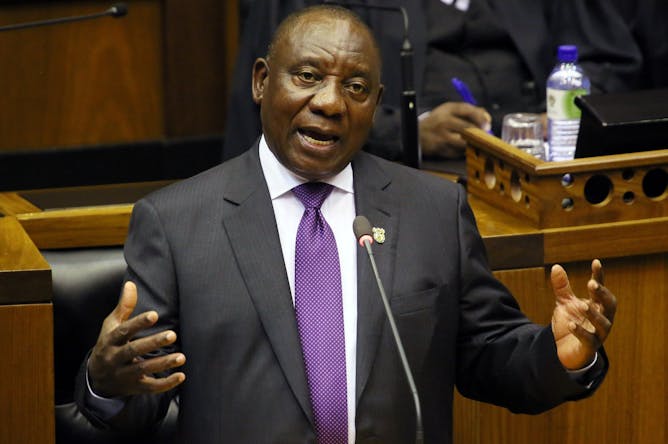|
Ethiopians were hopeful that Prime Minister Hailemariam Desalegn’s resignation last week would open the way for improvements in the country. But when the government almost immediately declared a state of emergency, optimism faltered and it seemed that an agenda of democratic reforms might not be foremost on politicians’ minds. Yohannes Gedamu explains.
The reaction to South African President Cyril Ramaphosa’s first state of the nation speech has been overwhelmingly favourable. Roger Southall explains how Ramaphosa pressed all the right buttons, and managed to restore dignity and decorum to South Africa’s parliament. For his part, Mark Swilling argues that Ramaphosa must rebuild the country’s institutions as the centrepiece of a new economic policy while Keith Gottschalk digs in to examine the dreadful legacy Jacob Zuma has left after nearly a decade in the presidential hot seat.
|

Outgoing Ethiopian premier Hailemariam Desalegn.
Tiksa Negeri/Reuters
Yohannes Gedamu, Georgia Gwinnett College
Now that Ethiopia's prime minister has made public his intention to resign, can the country's ruling coalition hold?
|

South Africa’s new president, Cyril Ramaphosa has in his state of the nation speech inspired hope.
Reuters/Ruvan Boshoff
Roger Southall, University of the Witwatersrand
The speech was delivered with panache and confidence. It had style, declaring to the nation and the world that he, Cyril Ramaphosa, was in charge.
|
Science + Technology
|
-
Ellis Adjei Adams, Georgia State University
New ways of managing water have emerged in some of Africa's urban and peri-urban areas.
|
|
Business + Economy
|
-
Mark Swilling, Stellenbosch University
South Africa has successfully defended its constitutional democracy. But the harsh reality is that the country still faces development challenges.
|
|
Politics + Society
|
-
Keith Gottschalk, University of the Western Cape
Zuma will go down in history as South Africa’s most corrupt head of government since Cecil Rhodes was prime minister of the Cape Colony.
|
|
Health + Medicine
|
-
Laetitia Rispel, University of the Witwatersrand
Setting up 24 hour clinics in a busy metropole such as Johannesburg would help those who need health care most.
|
|
From our international editions
|
-
David M. Pritchard, Université de Strasbourg; Lyn Carson, Western Sydney University
Politicians assume that voters cannot face the financial truth. To democracy experts this is just wrong. Involving voters results in better budgets as shows history from ancient Greece.
-
Rodwan Abouharb, UCL
In an age of increased scrutiny, violent and repressive states are turning to subtler methods of removing dissidents and opponents.
-
Coleen Suckling, Bangor University
Nightvision, ejectable stomachs and regrowable arms mean starfish are more than meets the eye.
-
Manoj Dora, Brunel University London
Climate change could hurt Indian farmers' income by up to 20-25% in the medium term.
|
|